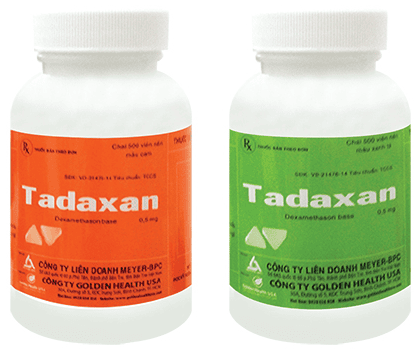This is an automatically translated article.
Ulcerative colitis is a persistent disease with many recurrent exacerbations, thereby greatly affecting the patient's life. To limit the frequency of ulcerative colitis exacerbations, patients can use the drug Azulfidine. So what is Azulfidine and how should it be used?
1. What is the effect of Sulfasalazine?
Azulfidine medicine contains the active ingredient Sulfasalazine 500mg, which is mainly used to reduce the frequency of exacerbations of ulcerative colitis. It should be noted that Azulfidine cannot completely cure ulcerative colitis.
Sulfasalazine 500mg can be used to treat rheumatoid arthritis in children and adults when other drugs have not worked. In addition, Azulfidine can also be used in some cases that are not mentioned in the instructions for use.
2. Some warnings of the drug Azulfidine
Some cases not to use Azulfidine:
Do not use when there is a history of allergy to Sulfasalazine; Bladder obstruction or bowel obstruction; Porphyria: An inherited enzyme disorder that causes symptoms affecting the skin or nervous system; Allergy to sulfa active ingredients; Allergy to aspirin or other salicylates. Patients need to inform the doctor if the medical history has the following problems:
Have frequent infections; Asthma ; Anemia, low white blood cell and platelet count; Liver or kidney disease. Patients should talk to their doctor if they are pregnant. Using Azulfidine during pregnancy can make it difficult for a pregnant woman to absorb folic acid. Folic acid helps prevent birth defects in the brain or spine of the fetus. Therefore, pregnant women who are prescribed Azulfidine may need to supplement with folic acid as directed by their doctor.
Sulfasalazine 500mg passes into breast milk and may cause diarrhea or bloody stools in a nursing infant. Therefore, female patients should inform their doctor if they are breast-feeding. The drug Azulfidine is not allowed to be used in children under 2 years of age.
3. Instructions for using Azulfidine
Patients need to read and follow all instructions for use of the drug on the product packaging or accompanying leaflet. The appropriate time to take Sulfasalazine 500mg is after meals. The patient should swallow the tablet whole, do not crush, chew or break the tablet. While using Azulfidine, the patient should have regular medical examination. At the same time, it is recommended to replenish the daily water requirement to ensure normal kidney function during treatment with Azulfidine. Note, Sulfasalazine 500mg may affect the results of some laboratory tests. Therefore, patients should inform their doctor or laboratory staff that they are using this product.
Azulfidine may lead to jaundice or dark urine. Therefore, it is important to inform your doctor if you experience any of these conditions as it could be a sign of liver problems.
If you are being treated for rheumatoid arthritis with Azulfidine, you should not stop taking other arthritis medications without your doctor's instructions. Sulfasalazine does not improve arthritis symptoms immediately, so patients still need to be treated with other drugs for a while.
Azulfidine can be part of a treatment regimen for rheumatoid arthritis, alongside other therapies such as rest and physical therapy. Patients should strictly follow the instructions of the treating doctor.
Symptoms of an overdose of Sulfasalazine 500mg may include vomiting, stomach pain, drowsiness or convulsions... If overdose and abnormal symptoms occur, the patient should contact a medical professional. for treatment instructions.
4. Azulfidine side effects
The patient needs urgent medical attention if symptoms of a serious allergic reaction (such as skin rash, difficulty breathing, swelling of the face or throat) or severe skin reactions occur in the patient's body. Azulfidine use.
Some severe reactions to the active ingredient Sulfasalazine affecting multiple organs may require medical intervention with symptoms such as skin rash, fever, swollen glands, muscle aches, weakness, appearance unusual bruising or yellowing of the skin or eyes.
Patients using Azulfidine are at increased risk of infections, even very serious or fatal. Therefore, the patient should immediately contact the treating doctor if there are the following signs:
Fever, chills, sore throat; Mouth ulcers, red swollen gums; Pale skin, easy bruising, unusual bleeding; Chest pain, wheezing, dry cough or vomiting, rapid weight loss. In addition, people using Azulfidine should contact their doctor immediately if they have the following problems:
Fever with headache, rash and vomiting; Skin rash of all degrees; Severe nausea, vomiting at the beginning of treatment with Azulfidine; Oliguria or anuria, foamy urine; Swollen eyes, ankles or feet, weight gain; Liver problems such as loss of appetite, right lower quadrant pain, dark urine, jaundice, yellow eyes.
5. Drug interactions of the drug Azulfidine
Certain drugs can affect how Azulfidine works, including prescription and over-the-counter medicines, vitamins, and herbal products. Therefore, patients should talk to their treating physician about all medications they are taking or any products that have been started or stopped during treatment with Azulfidine.
6. Some frequently asked questions about the drug Azulfidine
6.1. Is Sulfasalazine 500mg immunosuppressive? Azulfidine can suppress your immune system by lowering your white blood cell count. As a result, there is a risk of serious infections or death. Patients who are being treated with Azulfidine and have signs of infection such as fever, chills, shortness of breath, cough, pale skin, sore throat, mouth sores, red or swollen gums... should contact immediately. with treating physician.
6.3. Does Azulfidine cause weight gain? Sulfasalazine can cause kidney problems, leading to increased fluid accumulation in the body and weight gain. Patients may have swelling of the eyes or arms, ankles or feet, accompanied by little or no anuria.
6.4. Does sulfasalazine cause hair loss? Hair loss is a side effect that has been reported in association with Azulfidine in one patient with a severe allergic reaction. However, this is not a common side effect. Autoimmune conditions in rheumatoid arthritis and systemic lupus erythematosus may be the cause of hair loss.
6.5. How long does Sulfasalazine stay in the body? Oral Azulfidine is broken down in the intestinal tract to the more active sulfapyridine. Elimination time for sulfasalazine is about 1.5 to 2 days, and sulfapyridine is 2 to 3.5 days. Elimination time can vary depending on many factors, including age, health status, body's metabolic rate, sugar, and dose.
6.6. Is Sulfasalazine a steroid? Azulfidine is a non-steroidal anti-inflammatory drug such as prednisone or prednisolone, but has anti-inflammatory effects in certain cases and may help reduce the need for steroids. Sulfasalazine is an oral 5-aminosalicylate agent and is indicated primarily for ulcerative colitis and rheumatoid arthritis.
6.7. Does sulfasalazine cause high blood pressure? Azulfidine was not associated with hypertension in a clinical study. In addition, the manufacturer's product information does not list side effects that cause high blood pressure.
Please dial HOTLINE for more information or register for an appointment HERE. Download MyVinmec app to make appointments faster and to manage your bookings easily.













